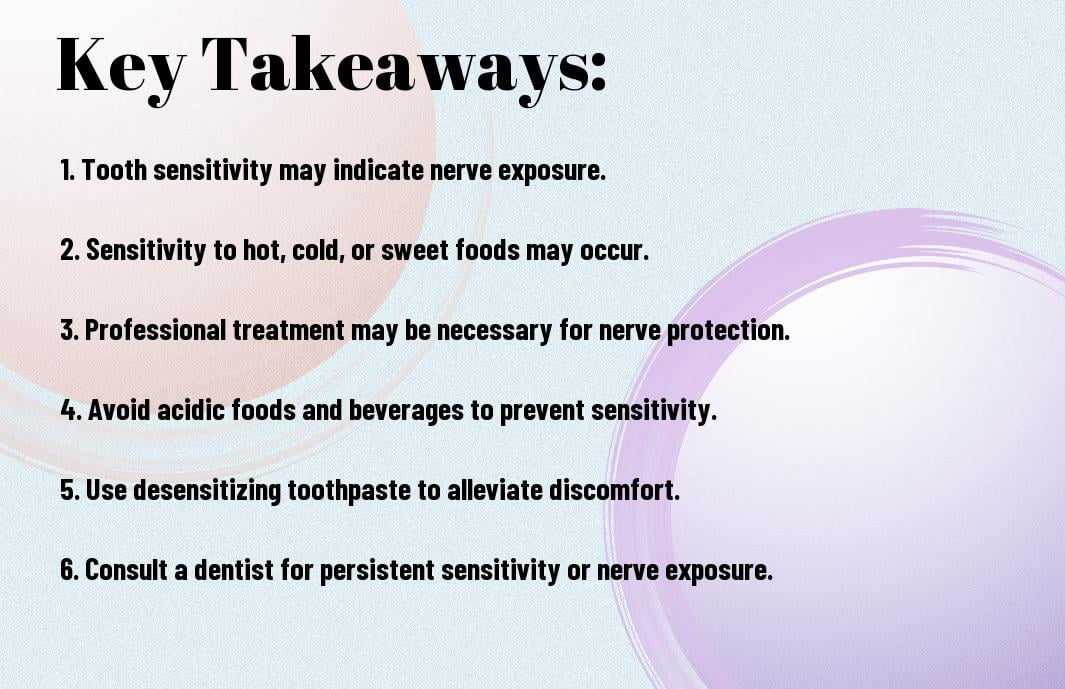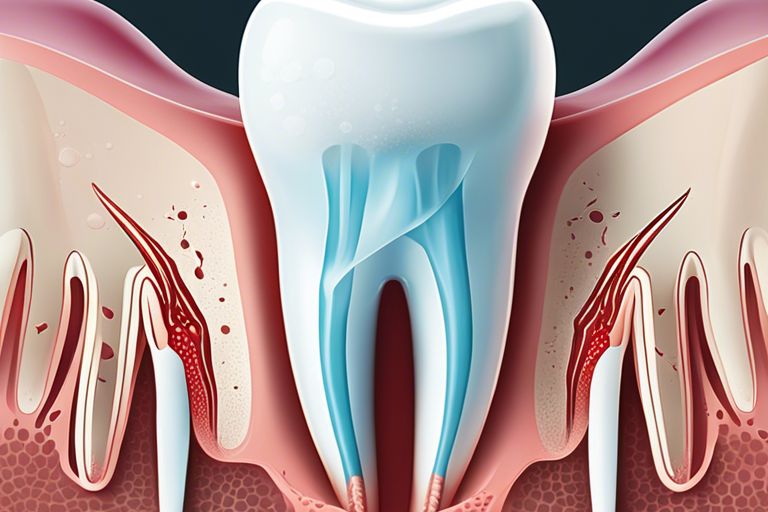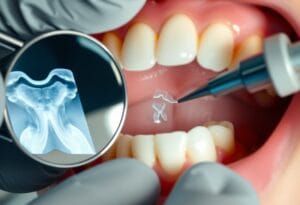Many factors can contribute to tooth sensitivity and the potential exposure of nerves in your teeth. Understanding these considerations is crucial for maintaining good oral health. In this informative blog post, we will explore the causes of tooth sensitivity, the risks associated with nerve exposure, and practical tips on how to prevent and manage these issues effectively. By staying informed and taking proactive steps, you can ensure the health and comfort of your teeth for years to come.
Key Takeaways:
- Tooth Sensitivity: Tooth sensitivity can be caused by various factors, including enamel erosion, gum recession, or tooth decay. Consult a dentist to determine the underlying cause.
- Nerve Exposure: Nerve exposure, often due to deep cavities or trauma, can lead to severe pain and sensitivity. Prompt treatment is imperative to prevent further complications.
- Preventive Care: Practicing good oral hygiene, using desensitizing toothpaste, and scheduling regular dental check-ups can help prevent tooth sensitivity and nerve exposure.


Causes of Tooth Sensitivity
The sensitivity of your teeth can be caused by a variety of factors. Understanding the root cause can help you manage and prevent discomfort. Here are a few common reasons for tooth sensitivity:
Dental Work and Procedures
Work such as fillings, crowns, or teeth whitening procedures can sometimes lead to increased tooth sensitivity. This is because these treatments can irritate the nerves in your teeth, causing temporary discomfort. If you experience sensitivity after dental work, it usually subsides within a few days to a week. However, if the sensitivity persists or worsens, be sure to follow up with your dentist.
Tooth Decay and Cavities
Decay in your teeth can result in cavities, which can expose the sensitive inner layers of your teeth to external stimuli like hot, cold, sweet, or acidic foods and beverages. When the enamel of your teeth wears down due to decay, it can lead to increased sensitivity. Ignoring cavities can also lead to more serious complications such as nerve exposure and infections.
Understanding the importance of early detection and treatment of tooth decay is crucial in preventing further damage to your teeth and reducing sensitivity. Regular dental check-ups and good oral hygiene practices can help catch decay in its early stages and prevent it from progressing.
Gum Recession and Exposed Roots
Tooth sensitivity can also be caused by gum recession, which exposes the roots of your teeth. The roots are not covered by protective enamel like the rest of your teeth, making them more susceptible to external stimuli. Factors such as aggressive brushing, gum disease, or aging can contribute to gum recession and lead to increased tooth sensitivity.
A consultation with your dentist can help determine the cause of your gum recession and develop a treatment plan to alleviate sensitivity and prevent further recession. Using a soft-bristled toothbrush and practicing gentle brushing techniques can also help protect your gums and prevent additional recession.
Identifying Nerve Exposure
Little do people realize that nerve exposure in a tooth can lead to excruciating pain and cause long-term damage if left untreated. It is crucial to be able to identify nerve exposure early to prevent further complications and address the issue promptly.
Symptoms and Warning Signs
Symptoms of nerve exposure may include sharp, shooting pain when consuming hot or cold foods, sensitivity to touch or pressure, and discomfort that lingers even after the stimulus is removed. If you experience any of these warning signs, it is important to seek dental care immediately to assess the situation and prevent potential complications.
Visual Examination and Diagnostic Tools
Warning: Visual examination by a dental professional is crucial in identifying nerve exposure. Your dentist may use tools such as a dental explorer to gently probe the affected tooth and assess any damage to the nerve. Additionally, dental x-rays may be necessary to determine the extent of the exposure and create a personalized treatment plan for you.
Identifying nerve exposure requires a comprehensive evaluation by a dental professional. The visual examination and diagnostic tools used by your dentist will help determine the best course of action to address the issue and alleviate your discomfort.
Distinguishing Between Sensitivity and Pain
Tools such as an electric pulp tester or cold air test may be employed to differentiate between tooth sensitivity and nerve exposure. Your dentist will carefully evaluate your symptoms and responses to these tests to make an accurate diagnosis and recommend the appropriate treatment. Recall, addressing nerve exposure promptly is crucial to prevent further complications and preserve the health of your tooth.
Risk Factors and Prevention
Keep in mind that certain risk factors can predispose you to tooth sensitivity and nerve exposure. By being aware of these factors, you can take preventive measures to protect your dental health.
- Knowing your genetic predisposition and family history can provide valuable insights into your likelihood of experiencing tooth sensitivity and nerve exposure.
Genetic Predisposition and Family History
Any history of tooth sensitivity or nerve exposure in your family members can increase your susceptibility to these issues. Genetics play a role in determining the strength of your enamel and the overall health of your teeth and gums.
Poor Oral Hygiene and Diet
Any neglect in maintaining good oral hygiene practices and consuming a balanced diet can contribute to tooth sensitivity and potential nerve exposure. Poor oral hygiene can lead to the buildup of plaque and tartar, which can erode enamel and expose the nerves in your teeth.
Understanding the importance of brushing and flossing regularly, as well as avoiding sugary and acidic foods, is crucial in preventing tooth sensitivity and nerve damage.
Avoiding Acidic Foods and Beverages
The consumption of acidic foods and beverages can weaken enamel over time, making your teeth more vulnerable to sensitivity and nerve exposure. Being mindful of your diet and choosing less acidic alternatives can help safeguard your dental health.
Diet plays a significant role in protecting your teeth from sensitivity and potential nerve damage. Limiting your intake of acidic foods and beverages, such as citrus fruits and carbonated drinks, can aid in preserving the enamel and preventing exposure of the dental nerves.
Treatment Options for Tooth Sensitivity
Now that you are familiar with the causes of tooth sensitivity, it’s vital to explore the various treatment options available to help alleviate your discomfort and improve your oral health. Here are some common approaches to consider:
Desensitizing Toothpaste and Mouthwash
One of the first lines of defense against tooth sensitivity is using desensitizing toothpaste and mouthwash. These products work by blocking the transmission of pain signals from the tooth surface to the nerve, providing relief from sensitivity. They typically contain compounds like potassium nitrate or stannous fluoride, which help to soothe the nerve endings in the teeth.
Fluoride Treatments and Sealants
Tooth sensitivity can also be reduced through professional fluoride treatments and the application of dental sealants. Fluoride helps to strengthen the enamel and reduce sensitivity, while sealants provide a protective barrier for the teeth, preventing exposure to temperature changes and acidic substances. These treatments are often recommended by dentists to help manage sensitivity and improve the overall health of your teeth.
Options: If you opt for fluoride treatments and sealants, your dentist will apply a concentrated fluoride solution to your teeth, which helps to remineralize the enamel and make it more resistant to acid attacks. Sealants are thin coatings that are applied to the chewing surfaces of the back teeth, where sensitivity is commonly experienced. These treatments can be particularly beneficial for individuals who have weak enamel or are prone to cavities.
Bonding and Fillings
With more severe cases of tooth sensitivity, bonding and fillings may be recommended to restore and protect the affected teeth. Bonding involves applying a tooth-colored resin to the sensitive areas of the teeth to cover exposed dentin or nerve endings. Fillings, on the other hand, are used to repair cavities or damaged areas of the teeth, which can contribute to sensitivity. These treatments help to restore the structure of the teeth and alleviate discomfort associated with nerve exposure.
Treatments: Bonding and fillings are typically performed in a dental office using local anesthesia to ensure your comfort during the procedure. Your dentist will carefully assess the extent of the sensitivity and recommend the most appropriate treatment option to address your specific needs. By addressing the underlying cause of your sensitivity, bonding and fillings can help you enjoy a healthier smile and reduce your risk of further dental problems.
Managing Nerve Exposure
Pain Management and Relief
One of the most crucial aspects of managing nerve exposure is effectively managing pain and providing relief. If you experience nerve exposure, you may feel heightened sensitivity and discomfort. Your dentist may recommend over-the-counter pain medications to help alleviate the pain. Additionally, they may suggest avoiding extremely hot or cold foods and beverages to prevent further irritation to the exposed nerve.
Nerve Protection and Capping
An crucial step in managing nerve exposure is protecting the exposed nerve and capping it to prevent infection and further damage. Your dentist may apply a special dental material over the exposed nerve to seal and protect it. This process, known as capping, helps in promoting healing and reducing discomfort.
It is important to follow your dentist’s post-procedure instructions carefully to ensure the cap remains in place and the nerve is protected. Regular follow-up appointments may be necessary to monitor the healing process and make any adjustments if needed.
Root Canal Therapy and Extraction
Exposure of the nerve may sometimes require more advanced treatment options such as root canal therapy or extraction. In cases where the nerve exposure is severe or the tooth is severely damaged, your dentist may recommend a root canal procedure to save the tooth while removing the damaged nerve tissue. In more severe cases where the tooth cannot be saved, extraction may be necessary to prevent further complications and infections.
Protection of the exposed nerve through root canal therapy or extraction is crucial to maintaining oral health and preventing potential complications. Your dentist will discuss the best treatment option for your specific situation and ensure you receive the necessary care to protect your dental health.
Lifestyle Changes for Reduced Sensitivity
After addressing tooth sensitivity and nerve exposure, it’s vital to make some lifestyle changes to reduce discomfort and maintain oral health. Making simple adjustments to your daily habits can have a significant impact on reducing sensitivity and improving your overall well-being.
Brushing and Flossing Techniques
For brushing and flossing, using a soft-bristled toothbrush and gentle circular motions can help prevent further irritation to sensitive areas. Avoiding vigorous brushing and harsh flossing can protect exposed nerves and reduce discomfort. Additionally, using fluoride toothpaste can strengthen enamel and decrease sensitivity over time.
Dietary Modifications and Nutrition
With dietary modifications, incorporating more calcium-rich foods like dairy products, leafy greens, and almonds can help strengthen teeth and reduce sensitivity. Avoiding acidic and sugary foods can also prevent enamel erosion and further damage to exposed nerves. Additionally, staying hydrated by drinking plenty of water can promote saliva production, which aids in protecting teeth and reducing sensitivity.
Dietary changes play a crucial role in managing tooth sensitivity. Consuming a balanced diet rich in vitamins and minerals can support overall oral health and reduce sensitivity symptoms. Foods high in vitamin C, such as citrus fruits and bell peppers, can help maintain healthy gums and reduce inflammation that may contribute to sensitivity.
Stress Reduction and Relaxation Methods
Lifestyle modifications such as stress reduction techniques and relaxation methods can also help manage tooth sensitivity. High levels of stress can contribute to teeth grinding and clenching, which can exacerbate sensitivity and lead to further damage. Incorporating practices such as meditation, deep breathing exercises, or yoga into your daily routine can help reduce stress and improve overall oral health.
Modifications that promote relaxation and reduce stress not only benefit your oral health but also your overall well-being. Finding healthy outlets to manage stress can improve your quality of life and reduce the likelihood of experiencing tooth sensitivity and nerve exposure.
Summing up
Now that you have learned about considerations for tooth sensitivity and nerve exposure, it’s important to remember to always seek professional help if you experience any dental issues. Tooth sensitivity can be caused by various factors, ranging from underlying dental problems to everyday habits, so it’s crucial to address any discomfort promptly. Additionally, nerve exposure is a serious concern that requires immediate attention from a dental professional to prevent further complications. By staying informed and proactive about your dental health, you can help maintain a healthy and pain-free smile.
FAQ
Q: What are the common causes of tooth sensitivity?
A: Tooth sensitivity can be caused by various factors such as worn enamel, exposed tooth roots, cavities, cracked teeth, and gum disease. These issues can lead to nerve exposure and result in sensitivity to hot, cold, sweet, or acidic foods and drinks.
Q: How can nerve exposure affect tooth sensitivity?
A: When the nerves in your teeth are exposed due to factors like enamel erosion or gum recession, it can result in increased sensitivity and discomfort. Nerve exposure can make activities like eating, drinking, and even breathing painful, requiring prompt attention from a dental professional.
Q: What are some considerations for managing tooth sensitivity and nerve exposure?
A: To address tooth sensitivity and nerve exposure, it is necessary to consult with a dentist who can evaluate the underlying cause and recommend appropriate treatment. This may include using desensitizing toothpaste, applying fluoride treatments, getting fillings for cavities, or undergoing procedures like dental bonding or root canals to address nerve exposure and alleviate discomfort.





